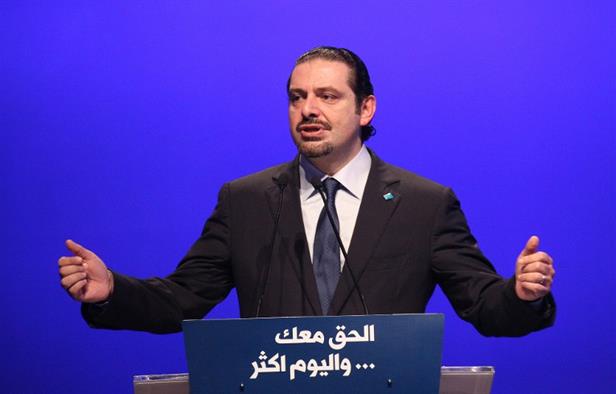Home alone/As Saad Hariri’s world melts, what can he do?
Michael Young/Now Lebanon/August 11/16
مقالة مايك يونك تتناول الأزمات والصعوبات المالية والسياسية والسنية الزعماتية للرئيس الحريري الذي يعاني من شبه افلاس مالي لشركة اجارو في السعودية التي ورثها عن أبيه كما انه يواجه شبه ثورة سنية لبنانية اعتراضاً على خياراته الفاشلة وعلى طريقة ادارة تياره المفكك والمنقسم على نفسه خصوصاً بعد الانتخابات البلدية الأخيرة
Is Saad Hariri in danger of losing control over both his Future Movement and Saudi Oger company? That is the question many people have been asking as the former prime minister struggles to reimpose himself on the domestic political scene.
Reports that Hariri and the Saudis have reached the final stage in negotiations for the sale of Saudi Oger (though to whom in the kingdom remains unclear) have yet to be confirmed. However, there is enough information from sources other than Hariri’s political enemies to lend credence to the view that Saudi Oger is bankrupt, and that, for all intents and purposes, the company has effectively slipped away from Hariri control.
With Saudi Oger insolvent and thousands of its employees abandoned without food and water, the problem had become a headache for Saudi Arabia. An Indian minister recently visited the kingdom to come to the assistance of his forsaken countrymen. The visit prompted the Saudi labor minister to announce that all back salaries owed to the company’s laborers would be paid, and that the Saudi government would take control of maintenance at Saudi Oger sites, supply water to the workers and cover their unpaid medical insurance premiums.
All this clearly suggests that the Saudi Oger crisis is too big for Hariri to resolve, which a number of sources, even within his Future Movement, have confirmed. But what of the former prime minister’s political organization? Since his return from self-imposed exile, Hariri has toiled to re-impose his authority over a Future Movement that had learned to live without him after his departure in 2011. Hariri’s financial woes will only make it more difficult to reverse this trend.
To a large extent Hariri is paying the price for several political missteps. His wager on Sleiman Franjieh for the presidency has failed, undermining his credibility with his followers, who were never enthusiastic about his choice of a Syrian ally in the first place. Worse, Hariri’s performance in the municipal elections varied between passable and disastrous. In Beirut his list won, but his reputation suffered as he backed candidates representing more of the same in the way the capital would be run. In Tripoli, his defeat, along with others, at the hand of a list backed by Ashraf Rifi was a harsh blow to a man who had always regarded the city and its surroundings as the backbone of his support.
At the same time, Hariri’s relations with his main Christian partner, Samir Geagea, deteriorated after the opening to Franjieh. The former prime minister’s move gave Geagea an excuse to normalize relations with Michel Aoun. Now, Hariri is relatively isolated in the convoluted Lebanese sectarian game, with even Walid Jumblatt keeping him at arm’s length.
At the same time, the public faces of the Future Movement today are Nohad Machnouk and Fouad Siniora, not Hariri. He remains the overall leader, of course, but the distinct sense is that the initiative has shifted away from him, and that this is having a negative effect on his political movement.
For instance earlier this week a story appeared in Al-Akhbar saying that Hariri had asked his parliamentary bloc about the possibility of voting for Aoun as president. According to a source for the story, only three members favored “studying” the idea of supporting an Aoun candidacy: Machnouk, the Protestant parliamentarian from Beirut, Basem Shabb, and the Maronite parliamentarian from Akkar, Hadi Hobeish.
The information was almost certainly leaked by a member of the Hariri bloc who opposes Aoun’s election and who sought to underline that the three parliamentarians, especially Machnouk, represented a small (mainly Christian) minority standing against a majority of members. In other words some bloc members were leaking against others, in a newspaper known to be opposed to Hariri no less, to score internal political points. That didn’t say much about the unity of the bloc, let alone Hariri’s ability to impose discipline on its members.
What are Hariri’s options at this stage? Allegedly, the Saudi Oger sale will include a clause that splits off the company’s maintenance branch and leaves it under the control of the former prime minister. If true, this will generate revenues for him, though far less than what he took in before. Hariri will have to downsize his expansive patronage network, and it will cost him in political support. He should probably give up the hope of remaining the Saudis’ favorite in Lebanon.
At the same time, with more room to maneuver vis-à-vis the kingdom, Hariri can try to reinvent himself. There remains a place in the political leadership for a Sunni moderate. It won’t be easy, especially as Hariri will have to contend with leaders who will play the sectarian populist card, portraying themselves as the individuals best able to oppose Hezbollah. But moderation usually has a way of making a comeback, as the experiences of Najib Mikati and Tammam Salam showed.
Saad Hariri should throw away the last 11 years since his father’s assassination and start over. That means ridding himself of the useless, corrupt hangers-on who populate the Future Movement. He still has much going for him, even as the masonry falls all around. The future, actually, is now.
**Michael Young is a writer and editor in Beirut. He tweets @BeirutCalling.






















